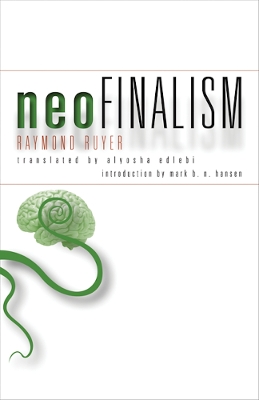Posthumanities
1 total work
Although little known today, Raymond Ruyer was a post–World War II French philosopher whose works and ideas were significant influences on major thinkers, including Deleuze, Guattari, and Simondon. With the publication of this translation of Neofinalism, considered by many to be Ruyer’s magnum opus, English-language readers can see at last how this seminal mind allied philosophy with science.
Unfazed by the idea of philosophy ending where science began, Ruyer elaborated a singular, nearly unclassifiable metaphysics and reactivated philosophy’s capacity to reflect on its canonical questions: What exists? How are we to account for life? What is the status of subjectivity? And how is freedom possible? Ha
Neofinalism offers a systematic and lucidly argued treatise that deploys the innovative concepts of self-survey, form, and absolute surface to shape a theory of the virtual and the transspatial. It also makes a compelling plea for a renewed appreciation of the creative activity that organizes spatiotemporal structures and makes possible the emergence of real beings in a dynamic universe.
